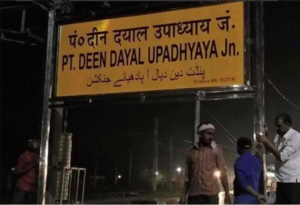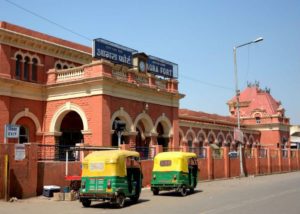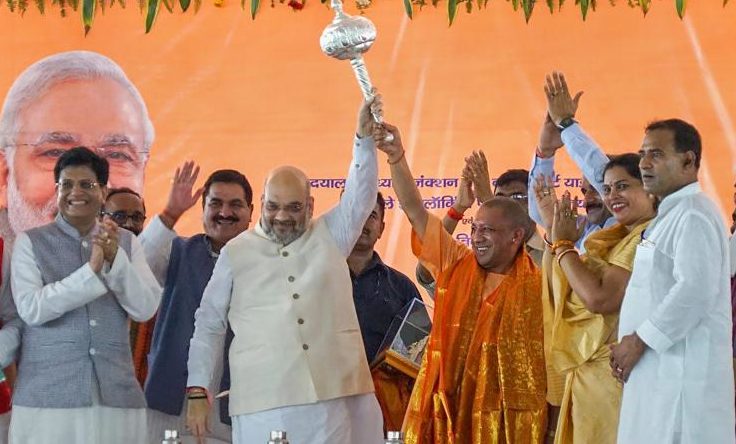What’s in a name, asked Shakespeare. More things than are dreamt of in your philosophy, old chum, said Ajay Mohan Bisht.
In other words, the Bard proposes, the Yogi disposes.
If the name-changing game catches on any more, cricket will be under serious threat as the country’s favourite sport. We live in exciting times. Going to sleep at night, you can never be sure you’ll wake up in the same place next morning. And such a wide variety of reasons too! Sadly, none backed by a strong sense of history. When the Mughalsarai station was renamed Pandit Deen Dayal Upadhyay Junction, it was ostensibly to honour the memory of the Jana Sangh leader who was found murdered at the station in 1968. Shouldn’t there be a stronger case for renaming the Mokama junction in Bihar after freedom fighter Prafulla Chaki then? Allahabad turning Prayagraj almost overnight was a nod to the great confluence of rivers, but also a lolly handed to the constituency of Hindu devotees converging in the city on the occasion of the Kumbh mela. Would the new name magically usher in better facilities for Kumbh pilgrims who brave potential stampede situations every time?
Now that Faizabad district is Ayodhya, of course we are halfway there to attaining Ram Rajya. Demands are flying in thick and fast from all corners. Agra must be Agravan or Agrawal (one waits for consensus on this), Ahmedabad must be Karnavati, Aurangabad must be Sambhaji Nagar, Osmanabad must be Dharashiv, Muzaffarnagar must be Laxminagar, Bhopal must be Bhojpal, New Delhi must be Indraprastha… and on and on it goes.
It would have all been very rum in this Lewis Carroll-Sukumar Ray world, but for a niggling question.
Who pays for these changing nomenclatures?
We do, obviously. A rebranding exercise that involves changing all signage, officially used printed material (including the cost of discarding the existing ones), names of institutions, and a number of other allied costs, is a huge burden on the exchequer that ultimately has to be borne by the ordinary taxpayer. In nine cases out of ten, one guesses, he didn’t sign up for it, and his life isn’t going to improve radically – unless maybe he holds a government printing contract.
But it is not as if names of places have started changing from last week – or in India alone. Since 1995, four out of the eight metro cities in India have changed their names, and the number will increase to five, if Ahmedabad becomes Karnavati following the flavour of the season. This invariably begs the question: Under what circumstances is a name change logical and its costs acceptable?

Since 1947, India, like many other countries ruled for centuries by colonial powers, has tried to erase, in a haphazard rather than a systematic manner, the imprint left by the British on the names of cities, streets and monuments. These have mostly happened at the behest of provincial ruling dispensations, to satisfy or reinforce a sense of regional pride. In some cases, such as West Bengal under communist rule, changes were made to reflect the ruling power’s ideological affiliations. Thus, Dharmatala Street became Lenin Sarani, Harrington Street became Ho Chi Minh Sarani, and so on. In Maharashtra, on the other hand, Maratha pride has repeatedly been invoked to bring about changes in names of towns, streets, institutions and landmarks.
What differentiates the earlier instances from the current bunch of rechristenings is, of course, the targeting of places bearing Islamic-sounding names. While this is totally in keeping with the BJP-RSS brand of politics, and therefore, should surprise no one, the way it is made to gain momentum in BJP-ruled states is certainly cause for concern, given the fact that we are only months away from the next general elections. Many of the cities and towns whose names are likely to be changed in the coming months in the same peremptory manner – particularly in Uttar Pradesh – have sizeable Muslim populations. The overnight decision, when it happens, is meant to remind Muslims of their station, and also perhaps a more sinister attempt at fomenting communal passions to engineer electoral gains through the tried-and-tested formula of polarizing along religious lines.
The problem for Yogi Adityanath and his friends in Delhi and Nagpur, however, is – to extend the Shakespearean analogy – that a Faizabad or an Allahabad by any other name will smell as foul – of false encounters, lynchings, dead infants, manufactured narratives of love jihad, unemployment, and useless saffronisation. Our favourite BJP spokesperson and roadside rabble-rouser Sambit Patra threatened on TV the other day that he would name mosques after Lord Vishnu. Perhaps he could also do everyone a favour by reminding the Yogi that his sweep-of-the-hand name changes are making him increasingly resemble an Islamic ruler by the name of Muhammad bin Tughlaq. At least historians have found sound logic and shrewd strategy behind some of Tughlaq’s decisions, such as the sudden shift of capital from Delhi to Devagiri-turned-Daulatabad. Yogi Adityanath can only hope history is as kind to him.

But right now, he has his hands full, and many names to change before he can sleep. The Ghaziabads and Mirzapurs and Aligarhs and Farrukhabads are waiting for their turn. For if you can’t be a game-changer, why not be a name-changer?
[The views expressed belong solely to the author, and may not reflect the opinions of the editorial team]


Comments are closed.